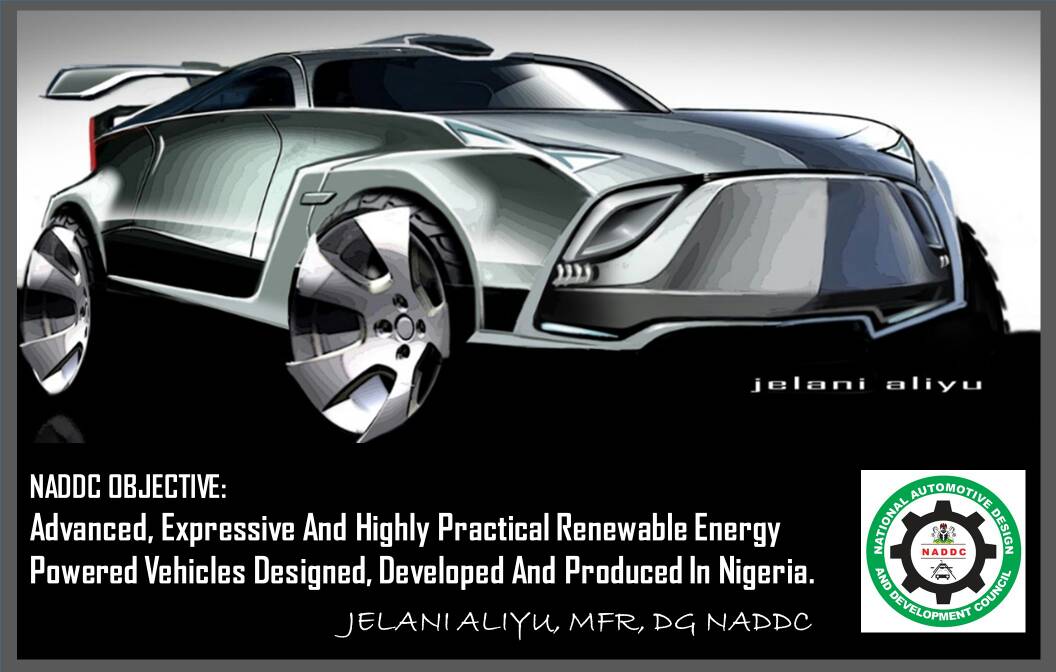By Olusegun Oruame
Work is in the pipeline at the National Automotive Design and Development Council (NADDC) to produce Nigeria’s first renewable energy powered vehicles. Led by its Director General, Mr. Jelani Aliyu, the NADDC is fine-tuning its blueprint for an “advance, expressive and highly practical renewable energy powered vehicles designed, developed and produced on Nigeria.” It is part of NADDC’s objective to put advance and affordable vehicles on Nigerian roads.
Conceived to end Nigeria’s overt dependence on imported used vehicles and also promote clean energy cars as is increasingly the global trend in the auto industry, the vehicles are designed to come at affordable and serviceable rates reflecting the unique weather and terrestrial challenges in Nigeria.
READ: https://itedgenews.africa/2017/10/21/automotive-agenda-jelani-aliyu/
Aliyu has a track record of a global inventor having invented the General Motors’ (GM) Chevrolet Volt (Chevy Volt) and has also built a reputation as a creative designer. He is charting a new course at the NADDC both to drive the policy for made in Nigeria vehicles by local manufacturers and also to get the NADDC to lead the innovative use of low cost advanced technology for mass production of Nigerian-made vehicles. In an interview months back with IT Edge News, he declared:
“I have always believed that we can’t afford to shy away from advance technology; it may seem scary at first, but ultimately, advance technology is in most cases even cheaper and less expensive than traditional ways of doing things. A good analogy I will give is when we were growing up, there were just landlines way before cell phones. They were everywhere like electric lines and very few people had phones in those days, just very few offices. And towards the latter part of that era a lot of the networks were down. A lot of the phones were just seated on the table and were not working. Then we just woke up one day and discovered everybody had cell phones.
“Now, the government didn’t wake up one day and say everybody must use cell phones; the government didn’t set up a cellular network company. What happened was that a new technology came along and it was fascinating and exciting and a couple of companies and entrepreneurs saw the opportunity and brought it to Nigeria.”
NADDC which recently sealed a youth empowerment scheme with Npower, the federal government’s job creation and empowerment initiative, plans to foster new skill sets among young Nigerians in auto designs and production of vehicles that will reflect Nigeria’s unique environment.
“A lot of the vehicles and technology in Nigeria and the rest of Africa are mostly transplanted. The vehicles are designed for other parts of the world, for other usage and brought into Africa. We must get our youths and our innovative talented Nigerians to be part of that conception and innovative phase. Most times, you hear people say Africans break stuff, Nigerians don’t have maintenance culture, if something breaks down we can’t fix it, well I say why don’t we design things that do not break. If that is the culture of the typical Nigerians or Africans to not want to fix stuff easily, if the environment is harsh then you owe to that culture, you owe it to those people to design something that is tough and durable,” said Aliyu to IT Edge News.
“If you were to design a vehicle for the desert, you will design it to accept or work in extreme temperatures. If you were to design it for the tundra of Russia, you will design it to fit that cold environment. So, we must take a lift from nature, we must emulate nature. All creatures adapt to the environment they live in. A camel in the Sahara is a magnificent sight that goes for miles and days without drinking water and then we have magnificent sea creatures in the depth of the ocean where sunlight doesn’t get there, they produce their own light to see their prey and to live,” he added.
































